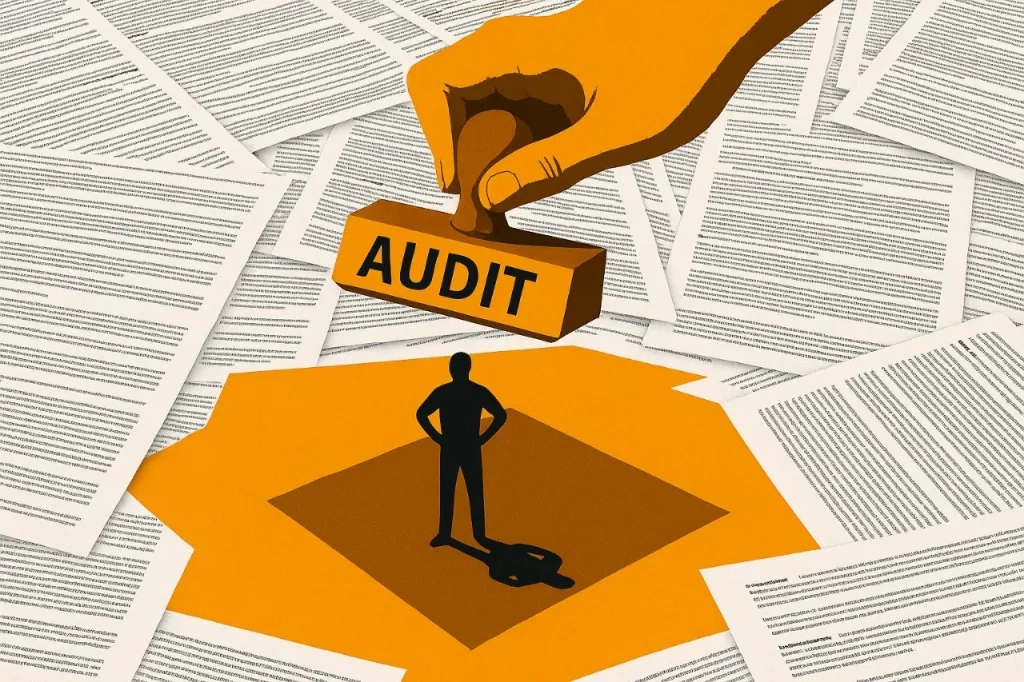IRS Red Flags: How to Avoid an Audit When Claiming Deductions as an Individual

Feeling nervous while filing your taxes? Because it sounds like the “sword of Damocles” hanging on your head. It sounds like a full-blown nightmare when the thought of an audit comes into mind.
As you know, already filing taxes as an individual is like walking on eggshells. A little mistake or a wrong add-up of numbers,ta-da you triggered the IRS audit. Many people don’t know that audits can be avoided if you play smart.But first of all you need to understand what mistakes cause IRS audits to trigger individuals in the first place.
In this blog, let’s learn how to be smart players and escape that dreadful audit letter seeking its way to your mailbox. Let’s have a keen look at the IRS red flags for individuals, which mistakes should be avoided when claiming deductions, and how to file smartly.
Red Flags that Trigger an IRS Audit?
The IRS is smart enough and knows all the possible ways people apply to avoid the tax payment. They have special software and highly qualified professionals that scan all the unusual patterns in tax returns. Some of the most common IRS audit triggers for individuals include:
Significant Business Losses
Reporting losses from a small business or side project regularly, particularly when there is little to no revenue for several years, could indicate that the endeavor is a hobby rather than a legitimate enterprise. For it to be eligible, the IRS requires that businesses turn a profit at least three of the five years. Maintain thorough documentation and be ready to present a legitimate business strategy.
Estimated or Rounded Numbers
If you file a return with rounded numbers in every category, it may give the impression that you are making assumptions rather than providing accurate information. These tendencies are detectable by tax software. Use precise numbers from digital reports, statements, or receipts. Being precise demonstrates your attention to detail and credibility.
Deductions Not Equivalent to Your Income
The IRS may become suspicious if you claim deductions that are significantly higher than your actual income. Based on your occupation and income category, the IRS can identify anomalous activity using historical data and statistical models. Always be sure your deductions are well-supported and appropriate.
Excessive Donations
Charity is admirable, but giving a significant portion of your income like you added 20% to 30% in donations, may draw criticism. The IRS may ask for documentation if your donations don’t appear to be in line with your income. Make sure all donations are made to approved groups and supported by bank statements, letters of acknowledgment, or receipts so that you stay clean in the audit.
Misuse of Home Office Deductions
The IRS is rigid about home office claims. There are no exceptions; the area must be used on a regular basis and exclusively for business. This means no part-time bedroom/office hybrids. It’s also critical to accurately determine the square footage and base your deduction solely on the percentage used for the company. Vague or overstated assertions can be easily identified.
Unreported Earnings
Copies of your W-2s, 1099s, and other income forms are sent to the IRS. Their system will detect the mismatch, if you fail to include side employment, freelancing work, or bank interest. For independent contractors, Uber drivers, content producers, and other gig workers, this is extremely important. Cash income is also required to be recorded. One of the quickest ways to be audited is to not do this.
Mistakes To Be Avoided While Claiming Deductions
Everything comes up with plus and minus, although claiming deductions helps to lower the tax bills but it can be a sore pain if done carelessly. Such a negligent attitude always backfires and IRS audits trigger individuals. Let’s explore the mistakes that people make when filing their deductions.
Exaggerated Deductions
It can be tempting yet dangerous to round up numbers or inflate figures, such as claiming more medical miles than you actually traveled or inflating home office repairs. Red flags are raised if anything appears excessively expensive in relation to your income. Just make assertions you can support.
Failure to Keep Up With Tax Law Changes
Tax rules change more frequently than most individuals realize. Deductions that were eligible last year may be limited or abolished this year. Use up-to-date software or contact with a tax professional to ensure you’re following the most recent guidelines.
Declaring Personal Spending as Business Expense
Although it may seem smart, using your Netflix membership for “research” is a common blunder. Business deductions must be routine and essential to your line of work. Don’t include it if it has nothing to do with how you make money.
Neglecting Documentation
Your deduction is probably going to be rejected in an audit if you don’t have invoices, mileage records, or receipts. Simply saying, “I remember buying it,” is insufficient. To document every expense, save bank statements, scan paper receipts, and maintain digital backups.
Incorrectly Assigning Dependents
An audit may be initiated if you claim a dependent who does not fit the IRS requirements, such as a roommate’s child or a relative you provide part-time assistance for. Dependents must pass age, relationship, residency, and support requirements. It’s common to misunderstand the regulations; make sure before making a claim.
Strategies To Prevent An Audit As An Individual
The IRS does not conduct audits at random; they follow a pattern, and you can claim all of the deductions you are eligible for without worrying if you steer clear of recurring traps. To be safe, follow these steps:
1. Organized record keeping
Keep track of all invoices, mileage logs, canceled checks, and receipts. This practice helps if you need to make changes to your return, even if you are not audited. Even if you work for yourself or are handling significant deductions, try to maintain records for a minimum of three years.
2. Be Detailed, and Honest
Report your income and deductions to the nearest cent; don’t wing it. Don’t round off numbers like $1,000 or $500. Accurate numbers provide the impression that your return is well-planned and authentic.
3. Submit Your Return Online
Electronic filing increases accuracy and decreases human mistakes. The majority of tax software checks for mathematical errors indicates dubious deductions, and makes sure you’re following the most recent tax laws. Bonus: your reimbursement will arrive sooner.
4. Get Expert Tax Assistance
Hiring a certified public accountant (CPA) or enrolled agent is worthwhile if your tax situation is complicated, such as if you are self-employed, own a rental property, or operate a side business. They know how to reduce your audit risk and maximize your deductions.
Behind the scenes of an IRS audit: It’s about fairness, not fear.
The IRS audit idea sounds intimidating but we must understand these audits are not meant to punish anyone. Yes, it gives goosebumps because all of us often neglect minor add-ups. These audits are designed to keep fairness in the U.S tax system. If the system relies on voluntary compliance it will widely open doors for fraud and inequality. When individuals and businesses claim inaccurate deductions, fail to report income, or submit dishonest returns, it shifts the tax burden to everyone else. That’s why the IRS uses a mix of technology, algorithms, and manual review to identify red flags.
IRS does not bother you without any mismatch; they use a system known as Discriminant Information Function (DIF) which scores tax returns based on how likely they are to contain errors. The higher the DIF score, the more likely the return is to be flagged for audit. Additionally, mismatches between W-2s or 1099s filed by employers and what you report can also trigger an audit. Everything is interconnected if a business reports paying you but you don’t report that income, the IRS system is alerted. Sometimes even business partners or employer’s filings come under scrutiny. It’s not always personal, sometimes you’re just connected to someone else under investigation.
But relax, keep a chill pill because IRS audits trigger individuals only when they fail to verify their claims. Maintaining records and keeping details is always the best defense. In the end, knowing how and why audits take place gives you the ability to file more intelligently rather than fearfully. Avoiding deductions is not necessary; just be prepared to defend them. Both individuals and organizations can profit from tax perks, which can drastically lower your tax liability without endangering you if you use them properly. In conclusion, stop terrifying yourself. The IRS is not spying on you, it’s just working hard to keep the system fair.
Tips for a Smooth Tax Season
Are you thinking of copying last year’s returns? Stop! Income and deductions change over the year and you might get triggered.
- Always be an early bird to avoid last-minute errors. As haste makes waste.
- Review your 1099s, W-2s, and all the tax forms carefully and if you don’t have an idea rely on the experts to review them for you.
- Telly IRS resources and publications if you are naive or unsure about deductions.

